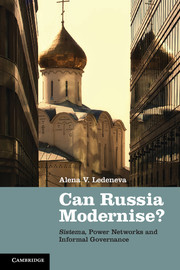Book contents
- Frontmatter
- Contents
- List of figures
- List of tables
- List of boxes
- Acknowledgements
- List of abbreviations and acronyms
- Introduction: modernising sistema
- 1 What is sistema?
- 2 Putin's sistema: svoi on top
- 3 The inner workings of sistema: from blat to otkat
- 4 Sistema's material culture: from vertushka to Vertu
- 5 ‘Telephone justice’ in the global age: from commands to signals
- 6 ‘Werewolves in epaulets’: from doublethink to doubledeed
- 7 From dealership to leadership: sistema and informal governance
- Conclusion
- Appendix 1 Survey questions
- Appendix 2 Interview questions
- Appendix 3 List of interviews
- Glossary
- Bibliography
- Index
- References
2 - Putin's sistema: svoi on top
Published online by Cambridge University Press: 05 February 2013
- Frontmatter
- Contents
- List of figures
- List of tables
- List of boxes
- Acknowledgements
- List of abbreviations and acronyms
- Introduction: modernising sistema
- 1 What is sistema?
- 2 Putin's sistema: svoi on top
- 3 The inner workings of sistema: from blat to otkat
- 4 Sistema's material culture: from vertushka to Vertu
- 5 ‘Telephone justice’ in the global age: from commands to signals
- 6 ‘Werewolves in epaulets’: from doublethink to doubledeed
- 7 From dealership to leadership: sistema and informal governance
- Conclusion
- Appendix 1 Survey questions
- Appendix 2 Interview questions
- Appendix 3 List of interviews
- Glossary
- Bibliography
- Index
- References
Summary
Technically, the term ‘Putin's sistema’ is a contradiction in terms. One should not personalise the logic of sistema, it is a collective outcome even if the President sets an example. The logic of sistema informs daily routines, exercised at all levels of leadership, and dictates the so-called ‘practical norms’ (Blundo and Le Meur 2009; de Sardan et al. 2006). According to one much-respected insider of sistema, the so-called ‘scissors’ between the strategic views and daily tactics of its protagonists is the ultimate obstacle to modernisation in Russia:
If you speak with a minister, with the PM, with the President, you are totally convinced you are on the same wavelength. They all say reasonable and sensible things. But when these strategic conversations turn to practical problems that have to be solved here and now…How do they solve them? By increasing state influence, by a telephone call to a judge or else…because…like…strategy is strategy; but we have to survive today and deal with these problems. There are many problems, important ones. In a big country, with huge responsibility…one has to solve them. We cannot wait until everything works automatically. Today we manually have to ‘help’ judges not to get lost ‘between three trees’…Not out of self-interest but for the common good (v interesakh dela): if you don't strengthen the anti-monopoly legislation you are then cornered to increase state influence. And so on. And of course you have to have an extraordinary political will to be able to monitor the strategy dimension on a daily basis, to be self-aware and reflect on your every move: whether it is in line with the strategy or goes sideways. For this you need not only political will but also an inner ‘compass’ – and that is catastrophically [lacking]. This is the problem. Say, for example, the President is convinced about the strategy of attracting some private capital, or private investment, into the defence industry but the next day at some meeting when discussing some concrete problem at a concrete defence enterprise, what kind of reflex does he have? To increase state influence! So what do we have here? Strategy is one thing, we understand how the modern world is organised and we want to adjust.
- Type
- Chapter
- Information
- Can Russia Modernise?Sistema, Power Networks and Informal Governance, pp. 50 - 84Publisher: Cambridge University PressPrint publication year: 2013



